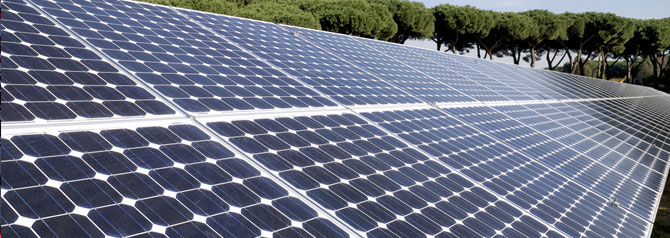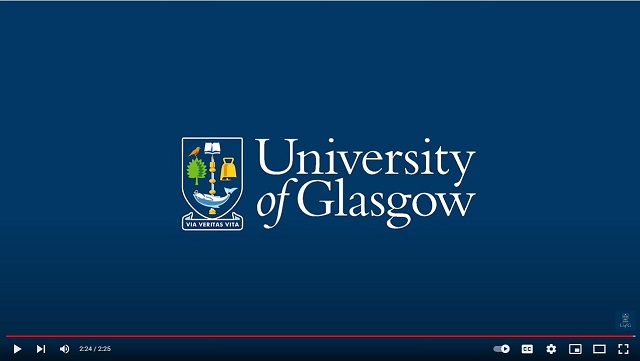Sustainable Energy MSc

The Masters in Sustainable Energy is an interdisciplinary programme that will equip you for employment within the international energy sector. This programme addresses all the key aspects of sustainable energy, from the most advanced technologies through to ethical and economic considerations.
- Teaching start: September
- Glasgow: Gilmorehill campus
- MSc: 12 months full-time
Why this programme
 https://youtu.be/EUBuv03ASV0
https://youtu.be/EUBuv03ASV0
- This programme provides an in-depth knowledge of the social and economic drivers of the current UK and international energy industry, and insights in the behavioural, business and technical aspects concerned with energy production and distribution.
- Students will learn a range of technical knowledge in the science and engineering of energy production and use, with emphases towards chemical, electrical and mechanical engineering, dependent on the students’ preferences and past experience.
- Students will graduate from this programme with a complete scientific knowledge and appreciation of the relevance of traditional and emerging energy technologies.
- Learning will be underpinned with regular industrial lectures and commentary so that the context is maintained and highlighted throughout the year.
- The MSc Sustainable Energy is accredited in the “Further Learning” category accredited by the Institution of Civil Engineers (ICE), the Institution of Structural Engineers (IStructE), the Institute of Highway Engineers (IHE), the Chartered Institution of Highways and Transportation (CIHT), and the Institution of Engineering and Technology (IET). This means that a student with an accredited BEng undergraduate degree can take the accredited "Further Learning" MSc to top-up their academic qualifications in order to meet the full academic requirements for conferral of the title of Chartered Engineer. This is an alternative route to the 5-year undergraduate MEng route.
- The programme is accredited by the Institution of Mechanical Engineers.
- Electronic and Electrical Engineering at Glasgow is ranked 1st in Scotland (Complete University Guide 2025).
- The School of Engineering has an Athena Swan Silver Award, demonstrating the school’s commitment to supporting women in scientific studies and careers, and to improving the working environment for all.
Programme structure
Modes of delivery of the MSc in Sustainable Energy include lectures, seminars and tutorials and allow students the opportunity to take part in lab, project and team work.
You will take a combination of core and optional courses, and a project which you will select from a list of standard projects or you can suggest a project of your own choosing.
Core courses
- Energy And Environment
- Energy Conversion Systems M
- Integrated Systems Design Project M
- Renewable and Sustainable Energy 4
- Engineering Skills M
- Waste Heat and Power-to-X
- MSc Project (60 credits)
Optional courses may include
- Electrical Energy Systems M
- Environmental Biotechnology 4*
- Environmental Ethics and Behaviour Change
- Industrial Aerodynamics M
- Nuclear Power Reactors
- Power Electronics and Drives M
- Theory And Principles Of Sustainability
- Power Electronics 2*
- Power Engineering 3*
- Thermal Engineering 4*
- Advanced Thermal Engineering 5
* One of these courses may be selected.
Programme alteration or discontinuation
The University of Glasgow endeavours
to run all programmes as advertised. In exceptional circumstances, however, the University may withdraw
or alter a programme. For more information, please see: Student contract.
Career prospects
The degree is designed to develop future leaders and decision makers in the growing international energy business. Graduates may expect to forge careers in established energy generation and transmission companies (for instance in the UK, National Grid, Scottish and Southern Energy, etc.), energy consultancy businesses, traditional oil, gas and construction companies who are moving rapidly into renewables, or fresh new companies in the wind, marine, solar or biomass sectors. Scotland, in particular, has seen great expansion in sustainable energy businesses in the last decade, with some of the best worldwide potential for wind, wave and tidal generation.
Graduates of this programme have gone on to work for companies such as Scottish Power, G-Volution and Cognolink. Positions include Geothermal Energy Engineer, Research Analyst, Hydropower Engineer and Research Assistant.
Explore our LinkedIn profile for a flavour of where our most recent graduates work.
Fees & funding
Tuition fees for 2025-26
MSc
UK
- Full-time fee: £12840
International & EU
- Full-time fee: £33450
Deposits
International and EU applicants are required to pay a deposit of £2000 when an offer is made.
Deposits: terms & conditions
Additional fees
- Fee for re-assessment of a dissertation (PGT programme): £370
- Submission of thesis after deadline lapsed: £350
- Registration/exam only fee: £170
Funding opportunities
British Council Scholarships for Women in STEM
The Bseisu- University of Glasgow Scholarship
University of Glasgow Partner Alumni Scholarship
GREAT Scholarships 2025
The Snowdon Trust Master’s Scholarship
Banco de Mexico
Erasmus+ Master Degree Loans
DAAD-University of Glasgow 1-year Master’s grant
Colfuturo Fundacion para el Futuro de Colombia
Chevening Scholarship
Commonwealth Scholarship Schemes
EU Welcome Award - January 2025 Intake Only
India Merit Award
University of Glasgow African Excellence Award
CONICyT (La Comsion Nacional de Investigacion Cientifica y Tecnologica de Chile)
University of Glasgow Caribbean Excellence Award
CONACyT (Consejo Nacional de Ciencia y Tecnologia) / FUNED Agreement
World Changers Glasgow Scholarship
Postgraduate Student Loan (Scotland and EU)
Postgraduate Tuition Fee Loans England only (PTFL)
Postgraduate Loans for Welsh Students
Alumni Discount
Postgraduate Access Scholarship
Global Leadership Scholarship
HESPAL Scholarship
Postgraduate Student Loan (NI)
World Changers Glasgow Scholarship PGT (EU)
Glasgow Excellence Award (UK)
Sanctuary Scholarships
The Dima Alhaj Scholarship
The Clan Gregor Society Prize
The scholarships above are specific to this programme. For more funding opportunities search the scholarships database
Entry requirements
2.1 Hons (or non-UK equivalent) in any Engineering discipline or Physical Sciences/Mathematics degree (including Environmental and Land Sciences), with modules in Engineering Maths and/or Maths at an average grade of 2.1 or non-UK equivalent.
We may sometimes accept degrees at 2.2 Hons (or non-UK equivalent) with an average grade of 2.1 or non-UK equivalent in core modules. or non-UK equivalent.
Accepted modules
International students with academic qualifications below those required should contact our partner institution, Glasgow International College, who offer a range of pre-Masters courses.
English language requirements
International students
We are proud of our diverse University community which attracts students and staff from over 140 different countries.
How to apply
To apply for a postgraduate taught degree you must apply online. We cannot accept applications any other way.
Please check you meet the Entry requirements for this programme before you begin your application.
Documents
As part of your online application, you also need to submit the following supporting documents:
- A copy (or copies) of your official degree certificate(s) (if you have already completed your degree)
- A copy (or copies) of your official academic transcript(s), showing full details of subjects studied and grades/marks obtained
- Official English translations of the certificate(s) and transcript(s)
- One reference letter on headed paper
- Evidence of your English language ability (if your first language is not English)
- Any additional documents required for this programme (see Entry requirements for this programme)
- A copy of the photo page of your passport (Non-EU students only)
You have 42 days to submit your application once you begin the process.
You may save and return to your application as many times as you wish to update information, complete sections or upload supporting documents such as your final transcript or your language test.
For more information about submitting documents or other topics related to applying to a postgraduate taught programme, see how to apply for a postgraduate taught degree
Guidance notes for using the online application
These notes are intended to help you complete the online application form accurately; they are also available within the help section of the online application form.
If you experience any difficulties accessing the online application, see Application System Help.
- Name and Date of birth: must appear exactly as they do on your passport. Please take time to check the spelling and lay-out.
- Contact Details: Correspondence address. All contact relevant to your application will be sent to this address including the offer letter(s). If your address changes, please contact us as soon as possible.
- Choice of course: Please select carefully the course you want to study. As your application will be sent to the admissions committee for each course you select it is important to consider at this stage why you are interested in the course and that it is reflected in your application.
- Proposed date of entry: Please state your preferred start date including the month and the year. Taught masters degrees tend to begin in September. Research degrees may start in any month.
- Education and Qualifications: Please complete this section as fully as possible indicating any relevant Higher Education qualifications starting with the most recent. Complete the name of the Institution (s) as it appears on the degree certificate or transcript.
- English Language Proficiency: Please state the date of any English language test taken (or to be taken) and the award date (or expected award date if known).
- Employment and Experience: Please complete this section as fully as possible with all employments relevant to your course. Additional details may be attached in your personal statement/proposal where appropriate.
Reference: Please provide one reference. This should typically be an academic reference but in cases where this is not possible then a reference from a current employer may be accepted instead. Certain programmes, such as the MBA programme, may also accept an employer reference. If you already have a copy of a reference on letter headed paper then please upload this to your application. If you do not already have a reference to upload then please enter your referee’s name and contact details on the online application and we will contact your referee directly.
Application deadlines
September 2025
International & EU applicants
Due to demand for degree places on this programme, the University has an application process with application rounds which recognises that different geographical areas complete and submit their applications at different times of the year. This process aims to ensure fairness and equity to applicants from all geographic regions.
Round 1 application dates: 1 October 2024 to 4 November 2024
All international applications submitted within these dates will be reviewed with no priority given to any geographic region. You will receive our decision on your application by 22 January 2025.
Round 2 application dates: 5 November 2024 to 16 December 2024
All international applications submitted within these dates will be reviewed with no priority given to any geographic region. You will receive our decision on your application by 10 March 2025.
Round 3 application dates: 17 December 2024 to 3 February 2025
Priority will be given to under-represented geographic regions. You will receive our decision on your application by 21 April 2025.
Round 4 application dates: 4 February 2025 to 24 March 2025
Priority will be given to under-represented geographic regions. You will receive our decision on your application by 19 May 2025.
Round 5 application dates: 25 March 2025 to 12 May 2025
Priority will be given to under-represented geographic regions. You will receive our decision on your application by 7 July 2025.
Round 6 application dates: 13 May 2025 to 7 July 2025
Priority will be given to under-represented geographic regions. You will receive our decision on your application by 18 August 2025.
All international applications submitted by 16 December 2024 will be reviewed and processed normally with no priority given to any geographic region. From 17 December 2024, priority will be given to applications from geographic areas which have been unable to submit applications before that point.
As we receive a great number of applications, prospective students are only allowed to apply once per year.
UK applicants
- 22 August 2025
Meet our future world changer
- Somesh Dhandapani: Future sustainability expert



